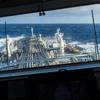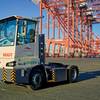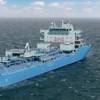LNG reloading operation is taking place at the liquefied natural gas (LNG) terminal operated by KN (AB Klaipėdos Nafta). The Klaipėda terminal, which has an operating history of three and a half years, is among the most efficient LNG terminals in Europe in terms of capacity utilisation.
This morning, the 50th load was delivered to the Klaipėda port by the Arctic Voyager, which has already been here several times. The LNG carrier brought 140,000 m3 of LNG from a liquefaction plant in Norway.
Since October 2014, when the FSRU Independence began operations in Klaipėda, the terminal has received 42 LNG imports, i.e. 5.4 million m3 of LNG.
The average size of one load was 139,000 m3 of LNG, while the largest shipment was delivered to Klaipėda terminal by the Valencia Knutsen, which has a capacity of 173,000 m3.
Gas has been supplied to Lithuania from four countries: Norway, the United States, Trinidad and Tobago, and Nigeria.
Tadas Matulionis, LNG Business Director at KN, estimates that since 2016, utilisation of Klaipėda terminal has been one of the highest among all of the LNG terminals in Europe, supplying about half of all of the natural gas consumed in Lithuania: “The demand for LNG terminal services remains high, with the terminal operating at over 90 per cent capacity during some months. Over three billion cubic metres of natural gas have already been provided for consumers in Lithuania, Latvia and Estonia.”
Utilisation of the terminal is also increased by the reloading of LNG to small-scale LNG vessels. The first reloading operation of this nature (from the floating storage regasification unit (FSRU) into a small-scale LNG carrier) was performed in the beginning of 2017, when the first small-scale LNG vessel, the Coral Energy, was received and loaded at the terminal.
After successfully reloading LNG from the FSRU, LNG export activities gained momentum, and since early 2017, the terminal has already performed eight LNG reloads for re-export to small-scale LNG import terminals in Sweden, Finland and Norway. Lithuania has become the 12th country in the world that LNG is re-exported from.
“Customers have discovered the advantages of the terminal and appreciate the efficiency of LNG transportation due to its convenient geographical location as well as the flexibility of our terminal and the ability to carry out both gasification and LNG reloading activities. This is particularly important in order to maximise utilisation of the LNG terminal and reduce its operating costs through the security component, which is part of the final gas price,” notes Mr Matulionis.
According to him, the LNG infrastructure that KN created and is developing further is becoming an accelerator for an LNG logistics chain to emerge in the Baltic Sea Region. When the KN LNG reloading station that loads LNG road tankers went into operation at the end of 2017, Klaipėda terminal became the first floating LNG terminal in the world offering a complete range of integrated LNG logistics services: LNG reloading, storage, gasification, and supply by land or sea.
The integral LNG and natural gas supply infrastructure created in Klaipėda is open on equal terms to all participants in the LNG market without exception.













